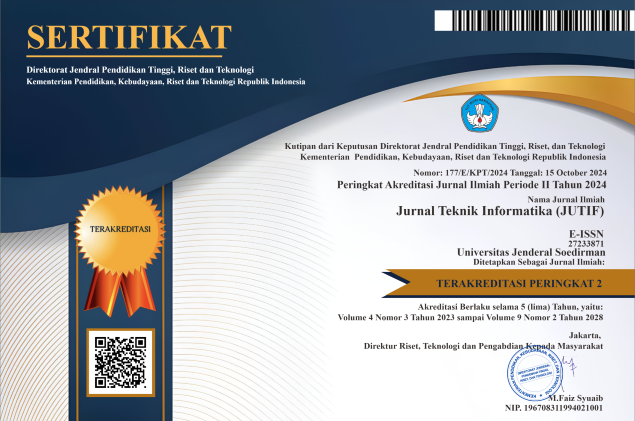IMPLEMENTATION OF THE WEIGHTED PRODUCT METHOD RECIPIENTS OF THE REGIONAL OPERATIONAL ASSISTANCE PROGRAM (BOSDA) FOR EDUCATION EARLY CHILDHOOD
DOI:
https://doi.org/10.20884/1.jutif.2022.3.4.220Keywords:
BOSDA, Metode Weigthed Product (WP), PAUDAbstract
One of the government's efforts in equitable distribution of education is to launch the PAUD Regional Operational Assistance (BOSDA) program by providing financial assistance for each PAUD with underprivileged students. This Regional Operational Assistance (BOSDA) aims to reduce the cost of education for underprivileged children, so that they can obtain early childhood education services that can optimally foster, grow, and develop the full potential of early childhood. The problem that occurs is the Determination of Regional Operational Assistance Recipients (BOSDA) which is not optimal and not right on target. The purpose of this research is to facilitate the UPT employees of the Education Office in determining the recipients of the Regional Operational Assistance (BOSDA) program with the right decision results. Therefore, the UPT Department of Education requires the right technology to assist employees in determining the recipients of PAUD Regional Operational Assistance (BOSDA). In achieving the research objectives, the analysis used is data analysis with quantitative methods which is a data analysis used if the conclusions obtained can be proven by numbers and also in the calculation of formulas that have to do with research analysis. The calculation process uses the WP method, so that the results of the assessment that have been carried out go through many calculation processes, ranging from weighting the values of all criteria and determining the value to getting a candidate for PAUD Regional Operational Assistance (BOSDA) at the UPT of the Buntu Pane District Education Office.
Downloads
References
I. E-government et al., Implementasi e-government dalam pelayanan publik. 2018.
A. Ainun and K. Kusmanto, “Rancang Bangun Aplikasi Data Tenaga Pengajar Pendidikan Anak Usia Dini (PAUD) pada Unit Pelayanan Terpadu (UPT) Dinas Pendidikan Rantau Selatan Berbasis Web,” U-NET J. Tek. Inform., vol. 2, no. 2, pp. 1–4, 2018, [Online]. Available: https://ejurnal.amikstiekomsu.ac.id/index.php/infotek/article/view/148.
M. Marthalina, “Peran Pemerintah Daerah Dalam Mengentaskan Kemiskinan Di Kabupaten Tangerang Provinsi Banten,” Transform. J. Manaj. Pemerintah., pp. 1–24, 2018, doi: 10.33701/jt.v10i1.403.
Y. Yenti and A. Maswal, “Pentingnya Peran Pendidik dalam Menstimulasi Perkembangan Karakter Anak di PAUD,” J. Pendidik. Tambusai, vol. 5, pp. 2045–2051, 2021, [Online]. Available: https://jptam.org/index.php/jptam/article/view/1218%0Ahttps://jptam.org/index.php/jptam/article/download/1218/1088.
M. D. Sinambela, H. Handrizal, and I. Irawan, “Penerapan Metode Multi Attribute Utility Theory Pada Peserta Didik Penerimaan Bantuan Operasional Penyelenggara (BOP) Pendidikan Anak Usia Dini,” Pros. Semin. Nas. Ris. Inf. Sci., vol. 1, no. September, p. 564, 2019, doi: 10.30645/senaris.v1i0.63.
Mashari, “Tanggung Jawab Pemerintah Daerah Dalam Penggunaan Dana Bos Untuk Pendidikan Dasar Yang Bermutu,” Spektrum Huk., vol. 18, no. 2, pp. 1–18, 2021, doi: 10.35973/sh.v18i2.2506.
I. Kuswandi, M. B. B. N. Wajdi, U. Al Faruq, Z. Zulhijra, K. Khairudin, and K. Khoiriyah, “Respon Kebijakan Pemerintah Desa Terhadap Peraturan Bupati Wajib Madrasah Diniyah,” Autentik J. Pengemb. Pendidik. Dasar, vol. 4, no. 1, pp. 7–14, 2020, doi: 10.36379/autentik.v4i1.46.
Yusri, “Implementasi Kebijakan Bantuan Operasional Sekolah Daerah (Bosda) Di Sekolah Menengah Pertama Negeri 02 Kabupaten Malinau,” J. Paradig., vol. 8, no. 2, pp. 105–113, 2019, [Online]. Available: http://e-journals.unmul.ac.id/index.php/JParadigma/article/view/3010.
A. T. Purba and V. M. M. Siregar, “Sistem Penyeleksi Mahasiswa Baru Berbasis Web Menggunakan Metode Weighted Product,” J. Tek. Inf. dan Komput., vol. 3, no. 1, p. 1, 2020, doi: 10.37600/tekinkom.v3i1.117.
F. Yanti and J. Sutresna, “Sistem Pendukung Keputusan Pemilihan Customer Terbaik Menggunakan Metode Wp,” JOAIIA J. Artif. Intell. Innov. Appl., vol. 1, no. 2, pp. 90–94, 2020.
E. W. Fridayanthie, N. Khoirurrizky, and T. Santoso, “Sistem Pendukung Keputusan Pemilihan Karyawan Terbaik Menggunakan Metode Weighted Product,” Paradig. - J. Komput. dan Inform., vol. 22, no. 1, pp. 41–46, 2020, doi: 10.31294/p.v21i2.6418.
D.Nisfatul Hijjah and et al, “Sistem Pendukung Keputusan Rekrutmen Karyawan Menggunakan Metode Weighted Product ( WP ) Pada PT . Quantex Tangerang,” J. I. Inform. Univ. Pradita, no. September, pp. 121–131, 2020.
S. Supiyandi, R. N. Fuad, and ..., “Sistem Pendukung Keputusan Pemberian Kredit Koperasi Menggunakan Metode Weighted Product,” J. Media …, vol. 4, pp. 1132–1139, 2020, doi: 10.30865/mib.v4i4.2367.
R. Arwin, Elserra Siemin Ciamas, Rina Friska B Siahaan, William Vincent, “Analisis Stress Kerja Pada PT. Gunung Permata Valasindo Medan,” Semin. Nas. Teknol. Komput. Sains, vol. 1, no. 1, pp. 75–78, 2019, [Online]. Available: http://prosiding.seminar-id.com/index.php/sainteks/article/view/126.
Rahayuning Putri Mahardikawati and Nurgiyatna, “Sistem Informasi Industri Kecil Menengah Pemerintahan Kabupaten Boyolali Berbasis Website,” J. Tek. Inform., vol. 1, no. 2, pp. 53–60, 2020, doi: 10.20884/1.jutif.2020.1.2.13.
A. Sudrajat, “Algoritma Weighted Product Untuk Pendukung Keputusan Dalam Penilaian Kinerja Guru Kelas,” vol. 01, no. 01, 2021.



























